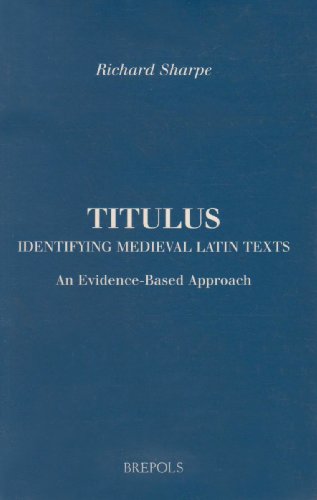Items related to Titulus Identifying Medi Latin Text (Brepols Essays...

Synopsis
This essay on the fundamental principles of medieval bibliography argues that the tituli and colophons accompanying a text in manuscript should be treated as evidence for the text's bibliographical data and therefore recorded in descriptive catalogues of manuscripts and in bibliographical repertories of texts. The value of medieval library catalogues in showing medieval bibliographical perceptions is illustrated. Bibliographical co-ordinates of author, title, and incipit are discussed in some detail, and the historical accumulation of bibliographical tradition is examined. Reference books intended to assist manuscript cataloguers and students of medieval Latin texts are subjected to criticism; an annotated handlist of such books is included. Many texts in the middle ages were ascribed to various writers, and the habits of titling were far from constant, but the evidence of the manuscripts provides a better basis for understanding the changing perception of texts than has been recognized in the reference literature. Two extended examples demonstrate, on the one hand, a text consistently ascribed in the manuscripts but much misattributed by modern scholars and, on the other, one whose authorship and title were the subject of much medieval alteration but can none the less still be recovered from the tituli.
"synopsis" may belong to another edition of this title.
About the Authors
Richard Sharpe is Professor of Diplomatic in the University of Oxford and a Fellow of Wadham College.
Richard Sharpe is Professor of Diplomatic in the University of Oxford and a Fellow of Wadham College. He is general editor of the Corpus of British Medieval Library Catalogues and author of A Handlist of the Latin Writers of Great Britain and Ireland.
"About this title" may belong to another edition of this title.
(No Available Copies)
Search Books: Create a WantCan't find the book you're looking for? We'll keep searching for you. If one of our booksellers adds it to AbeBooks, we'll let you know!
Create a Want